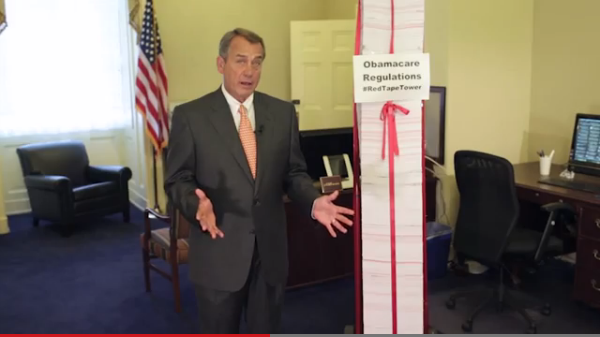The GOP's Many Bad Options For Fighting Obamacare

With Obamacare enrollment starting in just two weeks, and subsidized insurance coverage going into effect at the beginning of the year, congressional Republicans are attempting to make a last-ditch effort to take down the law before its biggest provisions go into effect. But so far, the party hasn't been able to coalesce around a strategy, or even a firm demand.
That's probably because none of the ideas floated so far are likely to do real damage to the health law and pave the way to better policy.
The idea that kicked off the push was to insist that any continuing resolution to fund the government also defund Obamacare. The House would pass a funding bill with no money for Obamacare. And then the Senate and the White House would have to sign it in order to prevent a government shut down.
But there are a bunch of problems with this plan. There's simply no reason to believe that President Obama or Senate Democrats would actually sign a continuing resolution that defunds the health law. Instead, they'd refuse. The government would shut down. And then, polls strongly suggest, Republicans would be blamed.
Now, there's an argument to be made that a government shutdown wouldn't be so bad. But here's the thing: A government shutdown wouldn't stop the implementation of Obamacare, according to the Congressional Research Service. Funding for the implementation process would continue. What a shutdown almost certainly would do is put a lot of public pressure on Republicans to give up and let Democrats take a win—as happened in the 1990s. (The polls on this are pretty clear: The public doesn't like Obamacare, but they like government shutdowns even less.) And if and when that happens, Republicans stand to lose gains they've made on federal spending through the sequestration as well.
That's what the defunding strategy gets the GOP: a loss on Obamacare, a loss on public opinion, and a loss on the sequestration spending restraint the party already won.
Others have proposed a different approach: Not defund, but delay. A coalition of activist groups have pushed delay as an alternative to defunding, arguing that it has a better chance of success. Over at The Weekly Standard, conservative health wonks James Capretta and Jeffrey Anderson make the case. Part of it is that the administration has already set the precedent, delaying the employer mandate and some of the law's verification procedures. Part of it is that the public appears more amenable to delay than defunding.
It's a much better, much more sensible argument than the one made by the defunders. But it still fails to solve the fundamental problem, which is that any delay effort will still require the acquiescence of both Senate Democrats and President Obama. That's just not likely. As Capretta and Anderson say, "Defunding Obamacare would achieve essentially the same result as delaying it, as each would temporarily prevent the overhaul from going into effect." Senate Democrats know this. So does President Obama. Which means they are about as likely to agree to a delay as to defund.
A final strategy is more limited: Push for a delay of the individual mandate only. Republicans might try this by either bargaining down from a request for a more comprehensive delay, or by simply making it their main demand.
It's unlikely that this would work either, because the Senate and White House roadblocks would be still be extremely difficult to surmount. But it's not quite unthinkable.
After all, a lot of Democrats were never quite thrilled with the insurance requirement. President Obama campaigned against the individual mandate during his first presidential run. Nearly two dozen House Democrats have already voted to delay the mandate. It's the least popular part of the law. Both Rasmussen and Reason-Rupe polls have found broad majority support for delaying the individual mandate. And the Congressional Budget Office (CBO) has estimated that nixing the individual mandate would reduce the deficit by reducing the number of people who get subsidies through the exchanges.
Yet if it did somehow pass, there are serious risks to this strategy as well. For one thing, CBO also said that individual market premiums would rise without an individual mandate in place. The taxpayer funded subsidies, meanwhile, would remain in place—meaning that spending through the law wouldn't be halted.
The biggest risk, however, is that in addition to gumming up the works for Obamacare, it also undermines the entire individual insurance market. That's because a delay of the mandate wouldn't merely be intended to remove an unpopular provision from the health law. It would be intended as a way to cause Obamacare to meltdown.
It's a strategy built on the understanding that the mandate is the lynchpin to the law, and that the individual insurance market would enter a death spiral—of higher and higher premiums and fewer and fewer covered individuals—without it. That's exactly what happened in a handful of states that passed Obamacare-style insurance regulations without a mandate. Once the death spiral starts, the thinking goes, the whole law becomes much easier for the GOP to repeal.
Maybe. Or maybe Republicans get blamed for the collapse and the headaches that result—and Democrats have an opportunity to pass an even more sweeping health law instead. Or maybe the fight over reform escalates, and nothing happens, and the subsidies remain on the books while the individual market becomes more and more dysfunctional. The point is, even if it passes—which is merely highly unlikely rather than utterly implausible—it's a hugely risky strategy, at best, and could eventually result in even worse health policy.
The truth is that Republicans don't have much in the way of good options to fight Obamacare in Congress. What they can do, however, is try to avoid risky strategies that could backfire and do more harm than good.


Show Comments (165)